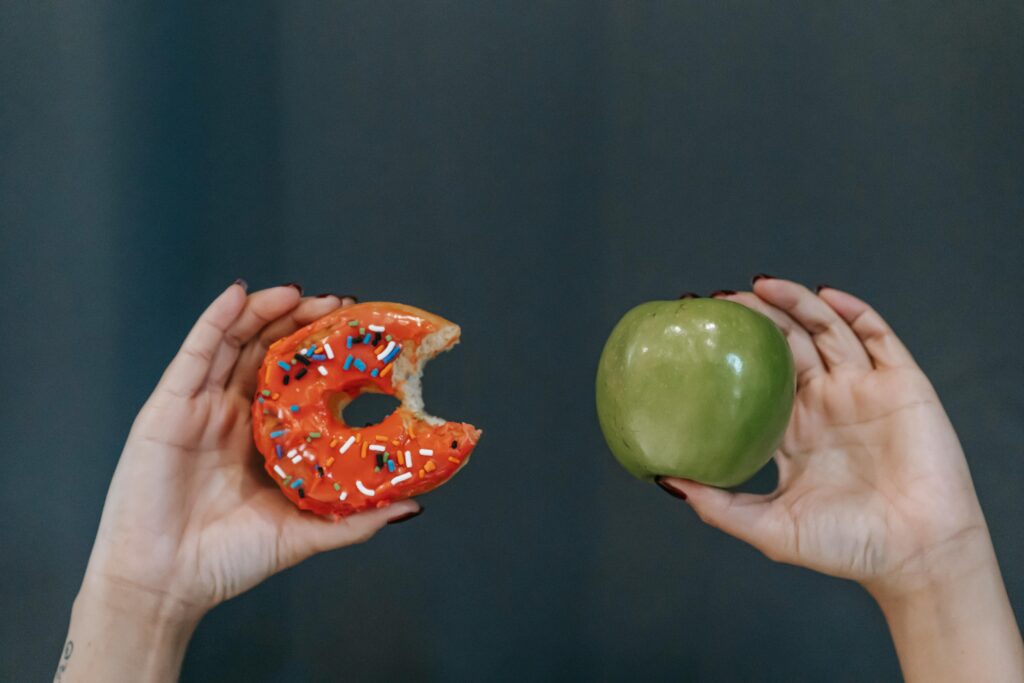Introduction
Sugar is present in everything, including unexpected foods, our favourite snacks, and our daily coffee. Although it offers a wonderful sweetness, consuming too much sugar has been connected to a number of health problems. The purpose of this essay is to provide further insight into the sugar-free diet and highlight its many advantages beyond weight reduction.
What is a Sugar-Free Diet?
A sugar-free diet calls for consuming less or no added sugars and sugar-containing foods. This does not imply that you must avoid all natural sugars or carbohydrates from fruits and vegetables. The emphasis should instead be on staying away from processed meals that are high in hidden sugars, sweetened beverages, and refined sugars. This aritcle of Well Weighed will also help you in your diet plan 5 Fibre-Filled Fails: Avoid These Common Mistakes in Your Diet
Common Misconceptions
A popular misperception is that a diet devoid of sugar is extremely limited and tasteless. Conversely, it can be tasty and varied, full of whole foods that support bodily functions. Another misconception is that it’s hard to stick to; but, if you use the appropriate techniques, leading a sugar-free lifestyle may be pleasurable and sustainable.
Health Benefits of a Sugar Free Diet
Improved Heart Health
Reducing sugar intake can have a significant effect on heart health. Overindulgence in sugar is associated with a higher risk of heart disease. You can lower bad cholesterol levels and lower your chance of getting cardiovascular problems by cutting back on sugar.
Enhanced Mental Clarity
Have you ever had a sugar crash? Excessive sugar intake can cause cognitive fog and make it harder to focus. Stable blood sugar levels are encouraged by a sugar-free diet, and this can help to improve memory, mental clarity, and overall cognitive function.
Stable Energy Levels
Sugar gives you a short energy boost that quickly fades, a phenomenon known as a “sugar crash.” Sugar consumption causes highs and lows in energy levels, which can be avoided by avoiding sugary foods and maintaining steady energy levels throughout the day.
Healthier Skin
Sugar-filled diets have been connected to premature ageing and skin issues including acne. Sugar reduction can result in more youthful-looking skin and clarity. This is due to the fact that excessive sugar intake can exacerbate inflammation and accelerate the loss of collagen and elastin, two essential proteins for healthy skin.
Better Digestive Health
A sugar-rich diet can upset the gut’s delicate balance of beneficial bacteria, resulting in digestive problems like bloating and pain. Eating a sugar-free diet supports improved digestion and general gut health by preserving a balanced gut flora.
Lower Risk of Chronic Diseases
Cutting back on sugar can dramatically reduce your risk of developing chronic illnesses like diabetes and some types of cancer. Reducing sugar intake can be a proactive move towards long-term health because it is known to be a risk factor for some ailments.
How to Start a Sugar-Free Diet

Identifying Hidden Sugars
Even meals that don’t taste sweet can have hidden sugars in them. It’s important to learn how to read labels and recognise components like maltose, dextrose, and high fructose corn syrup. Sauces, dressings, and even some “health” meals are frequently the culprits.
Substituting Sugary Foods
It’s important to swap out unhealthy snacks for healthier ones. Without the negative effects of sugar, natural sweeteners like stevia or monk fruit can sate desires for sweets. To stave off hunger, choose healthy snacks like nuts, seeds, and fresh fruit.
Meal Planning and Preparation
Making meal plans in advance will make it easier for you to follow a sugar-free diet. Make an effort to eat well-balanced meals that are rich in veggies, healthy fats, and lean proteins. There are tonnes of delicious and nutrient-dense sugar-free recipes online.
Challenges of a Sugar-Free Diet
Dealing with Cravings
One of the most difficult things about beginning a sugar-free diet is dealing with cravings. It’s critical to have coping mechanisms in place, such as sipping water, munching on some fruit, or engaging in a diversionary activity. Recall that perseverance is essential and that urges eventually fade.
Social Situations and Dining Out
It might be difficult to eat out and socialise when following a sugar-free diet. Never hesitate to inquire about ingredients and make meal adjustments. Make sure you have options that fit your diet by letting friends and family know about your dietary requirements.
Success Stories and Testimonials
Adopting a sugar-free diet has shown life-changing benefits for many people. The encouraging improvements include increased vitality, enhanced mental clarity, and healthier skin. Success stories from real life can inspire and shed light on the practicalities of leading a sugar-free lifestyle.
Conclusion
A sugar-free diet has several advantages beyond helping people lose weight. You can lower your chance of developing chronic diseases, increase mental clarity, maintain steady energy levels, attain healthier skin, and promote digestive health by cutting less on sugar. Accept the challenge, and you might discover that you’re feeling better than ever.
FAQs
Is it safe to completely eliminate sugar from my diet?
Yes, it is safe to eliminate added sugars from your diet. Natural sugars found in fruits and vegetables provide necessary nutrients and energy, so focus on reducing refined sugars.
How long does it take to see benefits from a sugar-free diet?
Many people start to notice benefits within a few weeks, such as improved energy levels and mental clarity. Long-term benefits like better skin and reduced risk of chronic diseases become more evident over several months.
Can I still eat fruits on a sugar-free diet?
Yes, you can still eat fruits. The natural sugars in fruits are accompanied by fiber, vitamins, and minerals, making them a healthy choice. Just be mindful of portion sizes.
What are some easy sugar-free snack ideas?
Great sugar-free snack options include nuts, seeds, fresh fruit, yogurt, hard-boiled eggs, and vegetable sticks with hummus.
Will I lose weight on a sugar-free diet?
While weight loss is a common benefit, the primary goal of a sugar-free diet is to improve overall health. By cutting out sugar, many people naturally consume fewer calories, which can lead to weight loss.





Pingback: Sugar Free Ice Cream: Flavors That Support Your Weight Loss Diet - Well Weighed